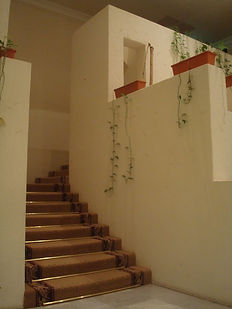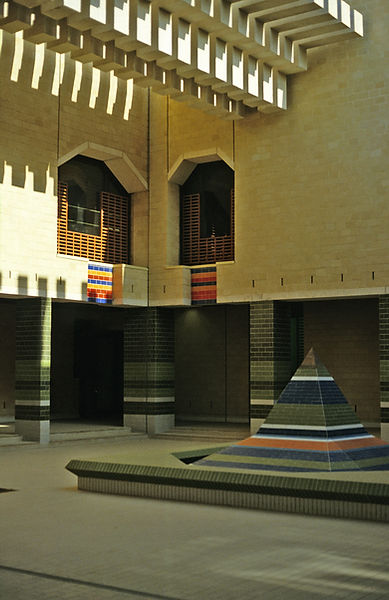Reima Pietilä's
Ministry of Foreign Affairs in Kuwait
History and Development

The research is contained in a chapter (70 pages) in my book
Read this chapter here

MINISTRY OF FOREIGN AFFAIRS, Kuwait. Before and After. Top: the complex as it stood in 1985 and underneath, as it stands in 2020. Scroll down to watch the transformations.
See also: Conference paper "Pietila revisited... revisited.... Afterthoughts " (2018).

Reima Pietilä
The development of this important building by a Finnish architect in Kuwait is a unique example of intercultural communication (or miscommunication) in architecture. It arguably represents the biggest culture clash in the history of architecture, paradoxically, produced by an architect who did everything to avoid such clashes. This webpage documents the different steps that have been undertaken over many decades.
In my book, I reevaluate the Pietiläs’ Kuwait project thirty years after its completion, show that the Ministry buildings have undergone significant transformations, and analyze the reasons for this.
وزارة الشؤون الخارجية الشهيرة (التي بنيت عام 1986) من قبل المهندس المعماري الفنلندي ريما بييتيلا واردة في أهم الكتب الدولية في العمارة الحديثة. ولا تقل أهمية عن الجمعية الوطنية في أوتزون أو أبراج الكويت. منذ عام 2012 لقد زرت المباني والتقطت الصور. لم يسبق للمهندسين أو المتخصصين أن زاروا المباني منذ عام 1986
This webpage is a monument to a building that no longer exists. Over 150 pictures of this building can be found on this page.


The Book: Transcultural Architecture
Pietilä's Kuwait project consisted of two interrelated tasks: the establishment of an urban plan for Kuwait and the construction of three buildings in the central part of the city. I discuss the urban plan, explain the difference between “Transcultural Architecture” and Critical Regionalism, and show how the Sief Palace Area project is related to these differences.
The Sief Palace Buildings are a school case permitting reflection on the possibilities and limits of Critical Regionalism. The project started with the best intentions but ran into problems that can be considered paradigmatic. Only a thorough analysis of the planning history, the context, the reception of the building as well as the architect’s theoretical ideas can clarify the complications through which this project went.
The book also contains a long subchapter providing a theoretical foundation of Transculturalism and, in architecture, its relationship with Critical Regionalism.
Conference in Helsinki in 2018


Preparing the photo exposition of the Pietilä Kuwait-Ministry at Alvar Aalto University in Helsinki in 2018.
Exposition curated by Gareth Griffith

Architects: Reima and Raili Pietilä. Picture from Architecture and Urbanism (Japan) 1983.
The original concept of the Ministry building is a "skin" into which holes have been cut, and through which one can see items inspired by regional culture.
Pietilä's Ministry has fascinated Italian fashion designer Anna Battista who sees it as an example of “architecture through tailoring” because the building offers a perfect “outside to inside vision.”




The building's "Skin concept" or "Inside-Outside Vision" is comparable with René Magritte's paintings Le Thérapeute or Le Double Secret.


Sief Palast Extension as presented by the European Commission. This building by Pietilä borders the Ministry of Foreign Affairs and is still extant.
Quickly after its accomplishment, the building underwent important modifications. The transformation process took more than 30 years and is documented here. All pictures after 2010 are by the author.
Street facade


Street façade (plan from 1983), accomplished accordingly in locally found sand lime brick. Photo from Architecture and Urbanism (Japan) 1983.

Same part of the façade after modifications in late 1990s (photo from 2011). Ironically, the initial guidelines from 1970 issued by the Ministry of Public Works, which Pietilä had to follow, advised against monumentality.

Same part of the building during further renovations in December 2016. In this picture one can see how the initial building (yellow), which is already a "skin," is literally covered with a new skin.

Accomplished new design in 2020.
More photos of the present situation



East façade with clock tower in 2020.
Old vs. New:
The Corridors

1986
Detail of facade in 1986

1986
Half open corridor in 1986

Same corridor after transformations undertaken in 1994

1997
Same detail in 2011

1986
present

The old shape of the doors has been maintained (both photos, left and right, are from 2017)
Old vs. New:
The Fountains

Old
Courtyard in 1986

New

With artifical grass in 2017

Pietilä did research on Uruk architecture. Uruk (today called Warka) is a city of ancient Mesopotamia about 400km north-west of Kuwait. The Northern part of modern Kuwait was part of ancient Mesopotamia, In 127BC Kuwait was part of the Parthian (Arsacid) Empire and the Kingdom of Characene was established around Teredon in present-day Kuwait. The Parthians ruled over Mesopotamia for a period.
The above is a visualization by artefacts.berlin.

Uruk, Karaindash temple (15th century). [from Béatrice Muller, Les antécédents orientaux des stucs architecturaux]
Same courtyard in 2012
The Coral Fountain


Picture from Expats Guide to Kuwait
1983

Pictures by Claudia Farkas Rashoud for Architecture and Urbanism (Japan)
1993

Same fountain clad in black granite tiles since probably 1993. Now entirely demolished.
The West Façade


West facade:
West entrance in 2012, still with fountain (black) and an added small arch for service entrance. Another picture of the same West facade, still without the arch.

Old

New
Detail of west façade in 2011
Same detail in 2017. The fountain together with other elements has disappeared and the arch has been enlarged
The North Façade:

North facade as planned and built
Same detail in 2017. The fountain has disappeared.



North facade in 2017
The East Façade:

As planned and built

After modifications in 2014

Same facade during further modifications in 2018

In 2020
Inside the complex

Old

New
Terrace in 1986
Same place in 2011


Above picture from Architecture and Urbanism (Japan) 1983
Old
New


Main hall in 2012. All tiles have been eliminated immediately after construction. The rugged ceiling shape has also been recitified.

Old
East entrance in 2012.

New
Same spot in 2017
More pictures of the situation in 2011


The only place where tiles can still be found is in the kitchen

.jpg)

Elements added by 2011



Remaining elements in 2011
Pictures from Architecture and Urbanism (Japan) 1983











Pictures from Janice Randall's Article
"Sief Palace Area Buildings, Kuwait" Mimar 16, 1984









The Arch



The same entrance today
This picture of the pagoda-like arch shows a detail from the East façade (Architecture and Urbanism, Japan) 1983.

The arch seen in this picture, which was taken from the Sief Palace tower.
(Picture from Randall' s article).
Slideshow 2017




Pictures from the Pietila Archive, Helsinki




More photos by Claudia Farkas Al-Rashoud (1983)





More writings on Kuwait
Transcultural Architecture (Book)
Summary of my research on Pietila's Sief Palace project (pdf).
"Kuwait Cyberpunk - Kuwait Oilpunk"
Conference paper "Pietila revisited... revisited.... Afterthoughts " (2018).





.jpg)



.jpg)


.jpg)





